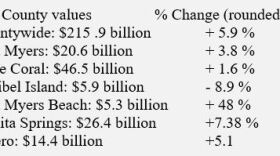The Argentine black and white Tegu is an escaped pet finding itself right at home in the wilds of Florida and the Southeast United States. Steve Johnson, associate professor and State Extension Specialist of wildlife ecology and conservation at the University of Florida in Gainesville, said the invasive lizard is cause for concern because unlike the Burmese python, tegus are adapting to cooler temperatures. However, like the python, tegus eat native species including native plants and the protected gopher tortoise.
"They are a threat to to native wildlife and if their populations were able to become dense enough, they could have some negative impacts on native species," said Johson. "For instance, if they got established in an area where there was a colony of burrowing owls, they could potentially wipe out a burrowing owl colony."
If people see one of the large black and white lizards, Johnson advises calling the Florida Fish and Wildlife Conservation Commission or a professional to trap and remove the reptiles.
"You can't just release them. They need to be humanely euthanized," said Johnson. "And that's not easy for a lot of folks to do. Also if you have one as a pet, make sure your caging requirements are secure, make sure your cages are secure."
Johnson said there are new requirements for keeping tegus as pets.
"You're no longer allowed to acquire a tegu as as a pet and if you have one you have to apply for a free permit from the Fish and Wildlife Conservation Commission. Your tagging has to be outfitted with a pet tag or a microchip so if it gets out they can trace it back to you," said Johnson. "We know they can survive in the wild, and they cause problems and they need to be taken out of the pet trade across the across the United States, particularly in the southeast where it's likely that they could become established."
People who see an Argentine black and white tegu, are encouraged to report the reptile to FWC. You can also contact FWC if you own a tegu as a pet and would like to get it microchipped, or to give it up. New restrictions adopted by FWC in February ban the ownership, sale and breeding of tegus and 15 other invasive reptiles. Under the new rules, Florida residents who already own a tegu are permitted to keep it, but they have to apply for a free permit and pet owners have until July 28 to get their tegus microchipped.







